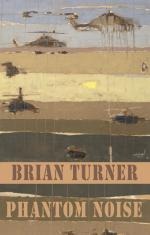Brian Turner is a former infantry team leader from the US Army. He toured in Iraq in 2003-4, where he wrote his first published collection, Here, Bullet. That was an extraordinary set of poems, documenting the violence of Iraq’s troubled streets far more intensely than the indifferent reportage of newsrooms. I discovered it through one of my occasional bouts of Keith Douglas obsession, finding a review in which Turner was compared to the Second World War poet. The comparison was justified and didn’t just stop at the professional similarities of two soldiers encountering bloody conflicts. There is something of Douglas’ style in Turner. Its hallmarks are these: striking visual images, no authorial commentary or passing of judgement, an urgent sense of what it was like to be alive during events described, and – as Douglas himself would have put it – absolutely no bullshit. 
Turner’s 2010 collection, Phantom Noise, sees him returned to his family in California, attempting to process all he has seen and done in Iraq. I found it a huge step forwards from Here, Bullet. It’s not just that Turner has improved as a poet – which he has – but that by juxtaposing further poems about the heat of conflict with both his childhood memories and difficult moments in which memory intrudes on his life in California, he creates a powerfully personal sense of a small world. America and Iraq become emotionally entangled, as if Iraq is the uneasy subconscious of the West.
Below are some videos of Brian Turner reading his work. I was hesitant about searching for them, since I felt like great care had been taken by the poet to construct a collection that would speak for itself, that would document the war from a personal level and not need a framework of explanation. It turns out Turner reads brilliantly and lets the strength of his writing do his talking. On a similar note I’d recommend reading this book from cover to cover. Normally I enjoy the way you can dip in and out of poetry books, but in this one the placement of each poem is impeccable, some of them ricocheting off of what’s come before, some echoing on as you read forward.
It will be interesting to see where Turner takes his poetry next. He proves on many occasions in Phantom Noise that he doesn’t need the extreme drama of war to head straight to the emotional core of a situation. I have a feeling he’s going to be a really important writer in the years to come…
~
That’s the end of my list for 2010 – thanks for reading. Throughout January I’ll be setting sail for St. Hauda’s Land to write a series of posts about The Girl with Glass Feet. In the meantime I hope you all have an amazing New Year.
Comments 1